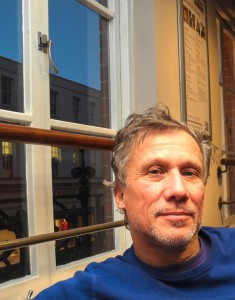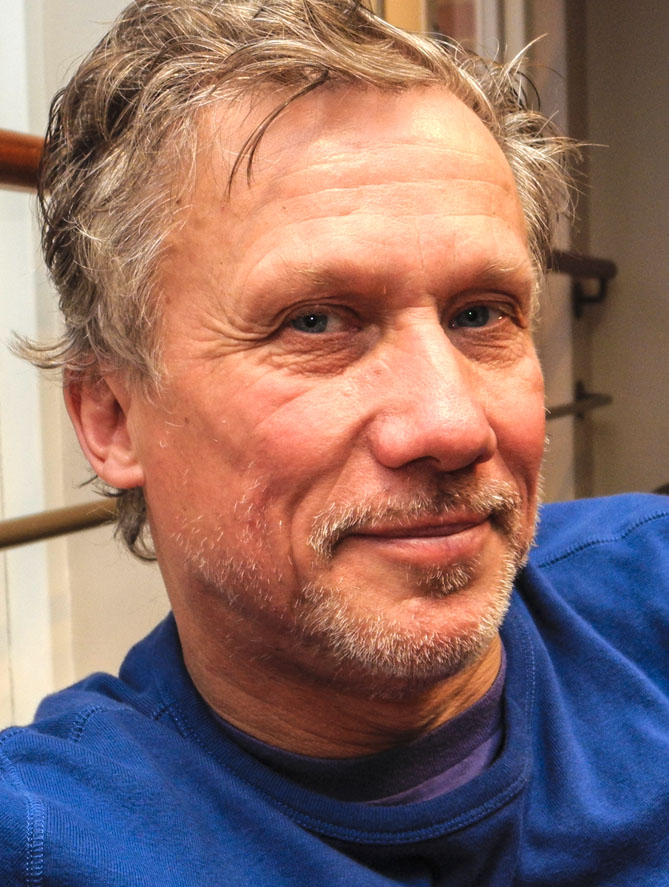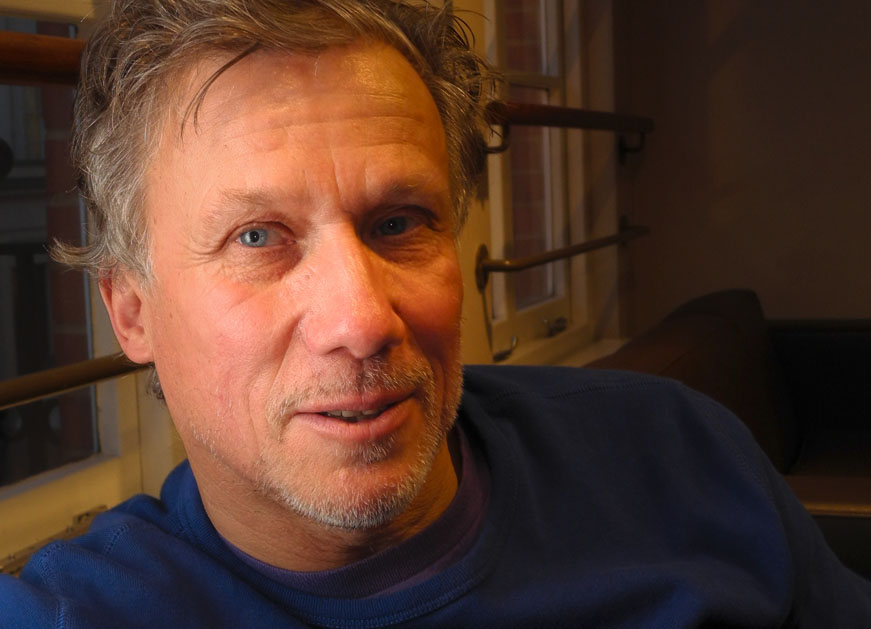Peter Duncan is a busy chap. For most of the past year he has been touring with the wonderful Birdsong and is now in the process of putting the final touches to this year’s Oxford Playhouse pantomime, Beauty and the Beast, which he is writing and directing.
Peter is a man of many hats – actor, writer, director, presenter, former Chief Scout. I asked him which of those he was most comfortable with and how he found himself being responsible for the Oxford panto. ‘I do a little bit of everything now. I write and direct the pantomime at the Oxford Playhouse every year. There was no real reason for it being Oxford. It was just something I was asked to do. I’ve done eight seasons there now; Beauty and the Beast will be my ninth. If something works, people tend to stick with you.’
But weren’t your family involved in pantomimes? ‘My parents were summer season and pantomime producers so I grew up in the variety world really, not that my pantos are anything like my mother’s and father’s, they’re very different but yes, I grew up with that romance in that sort of environment.
‘I went to Italia Conti stage school, but not very much because soon after I started – I left school at fifteen – I got some work playing Jim Hawkins in Treasure Island and then I got a job at the National and I was there for two years. I was going to Contis at the same time but if you saw my reports most of them said, “Where was he? He only attended one class last term.” All the teachers were really pissed off because I was working and they weren’t. I was at Olivier’s National for two years so that, mixed in with Contis, was my training. You couldn’t train anywhere better than that really.’
Because of your family and your career as a child actor, was it always inevitable that you would go into the theatre? ‘No, as a child it’s usually what your parents do. I had, in my secondary-modern school in South London, very conventionally done the school play, playing Truffaldino in Servant of Two Masters and I obviously enjoyed it. It seemed to come fairly naturally but I never really thought that that’s what I might do. There’s always been a lot of variety in my life so I’ve never lost interest in the business as I got older as a lot of kids do who’ve grown up in it. Because of the other things I do, when I come back to acting it’s always a nice feeling, you feel fresh. Also, working with a young company, as in Birdsong, that’s a nice feeling too.’
Birdsong is a very far cry from pantomime, a completely different kettle of fish. It must involve a very different approach. How do you go about it? ‘I do the Oxford pantomimes from scratch. I know people say, it’s “just panto”, but I do enjoy it. I enjoy structuring it, writing it and developing characters. You have a lot of people to please and I really try to make it interesting in the sense that you could just repeat what you’d done before, in some ways and put the same routines in. In Oxford we have a different company every year and I like the idea of getting people who’ve never done it before. You get a sort of vitality out of that because they’re not just repeating what they did last year, which is always the danger if you use the same people.’
 Pantomime traditionally brings together actors and what, I suppose, we must call variety artists – two very different disciplines. Actors can sometime feel a bit superior so how do you reconcile those two factions? ‘Well, that’s the interesting thing. You can persuade an actor that he’s been missing out if he’s never played a pantomime villain. I’ve had to do that a few times, convincing somebody that they could actually do it, or play the dame. There are people who are funny and there are those that act funny. It’s very important to have a strong, central comedy figure and I admit, sometimes you don’t quite get there. It’s always a challenge if you don’t want to be completely conventional but I think the public don’t judge things in the same way as a professional would.’
Pantomime traditionally brings together actors and what, I suppose, we must call variety artists – two very different disciplines. Actors can sometime feel a bit superior so how do you reconcile those two factions? ‘Well, that’s the interesting thing. You can persuade an actor that he’s been missing out if he’s never played a pantomime villain. I’ve had to do that a few times, convincing somebody that they could actually do it, or play the dame. There are people who are funny and there are those that act funny. It’s very important to have a strong, central comedy figure and I admit, sometimes you don’t quite get there. It’s always a challenge if you don’t want to be completely conventional but I think the public don’t judge things in the same way as a professional would.’
Most people I know, and certainly most of the actors, will say that a visit to a pantomime was their introduction to theatre. Pantomimes are incredibly important and influential. Peter agreed. ‘Most people’s first and sometimes only experience of going to the theatre is pantomime. Most of the actors you speak to will say that seeing a pantomime as a young child was what inspired them to go into the business. It’s like being a footballer, you see the thing you want to do and then try and do it. It’s very hard to resist if you find it joyful. It’s also that thing of when you first get on stage when you’re young and you’re pretending and it’s a release and it’s slightly addictive and great fun. Even in a play like Birdsong which is terribly dramatic there’s joy in performing.’
Are you never tempted to appear in your own pantomimes? ‘I never appear in the Oxford pantomimes,’ Peter laughed. ‘What I manage to do, because the Oxford one starts early, is to go off and be in another one, a more commercial one with my name on the poster, so I’ve managed to do both which is quite nice.’
In recent years it has become almost de rigueur to have a so called celebrity in panto and they seem to have almost replaced the old speciality acts that were a mainstay. Many, if not most of the personalities have no real talent apart from looking good and being able to read an auto-cue. How do you fell about that? Peter thought for a moment. ‘People like to see performers, celebrities, out of context not doing things very well. As a professional you always want thing to be as good as they can be but when it’s off centre or someone is odd doing something, audiences love it. I wouldn’t deny an audience the excitement of somebody very famous doing something in a panto.
‘I know actors generally think that’s fairly abhorrent. Everybody used to knock Frank Bruno, but he was good value. All he used to say was “C’mon Harry” and bring the house down. Of course you need good stock performers making up the company to make the show work properly and if somebody comes along who the public adore at that particular moment and they deign to do panto then it’s good to let them have a go.
‘I’ve just seen it too many times where I go along and have been cynical about a show only to find I really enjoyed their presence. Other times I’ve seen people who were really cool or you’d think would be really good only to find they couldn’t do it, they didn’t have the pace or the energy. They’ve come from stand-up or whatever and they don’t know it’s twice a day, full energy.’
Everybody loves pantomime – performers and audiences, but it can be very hard work. Peter agrees. ‘It needs a great deal of resilience to perform like that for weeks on end. It’s hard graft as anyone who’s done it will tell you.’
You’ll be able to see the results of all the hard work when Peter’s Beauty and the Beast opens at the Playhouse from 5th December. Click here for preview
Peter Duncan was talking exclusively to Michael Hasted
Text and photos © Michael Hasted 2014. All rights reserved. No reproduction in part or in full without prior permission.



